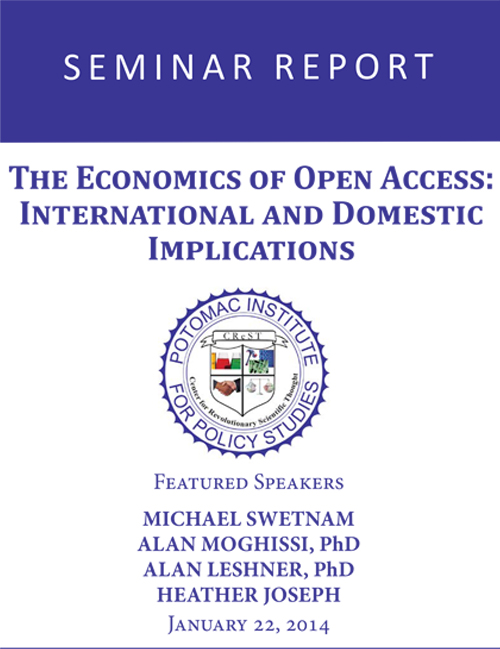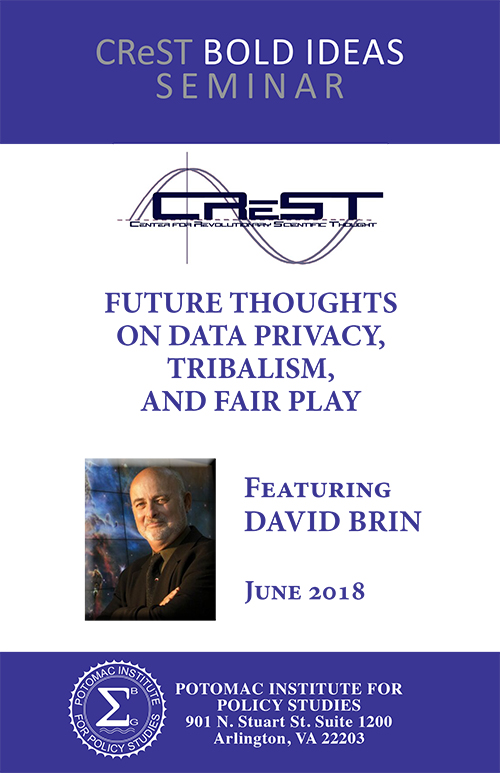Center for Revolutionary Scientific Thought (CReST)
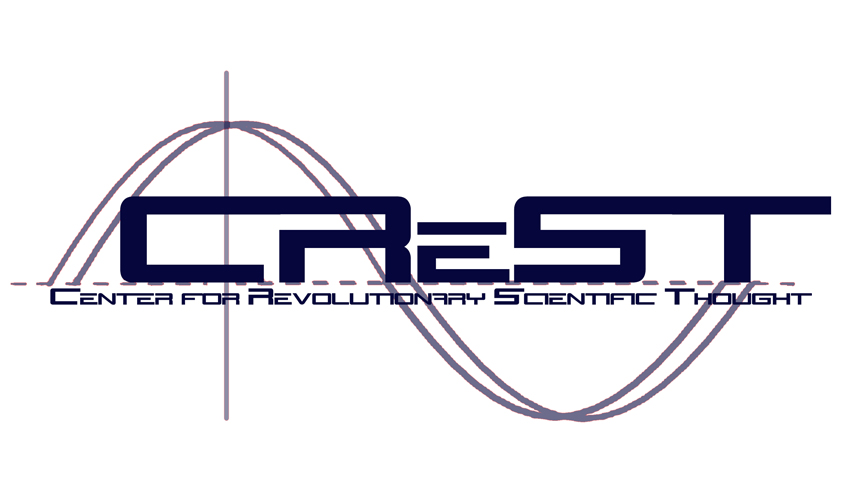 The Center for Revolutionary Scientific Thought (CReST) is the Potomac Institute’s futures group. The Center identifies and studies potentially-disruptive, emerging S&T areas and thinks through the policies that will be needed years, even decades, in advance. Disruptive technologies present unique challenges, and often policy ideation and implementation lag technology adoption. Forming meaningful policy requires thinking through a number of considerations, such as potential societal-level implications of the technology, unintended consequences, pathways for development, and possible derivative technologies. To be ready with well thought-through policy, we must start studying emerging technologies and their potential implications years in advance.
The Center for Revolutionary Scientific Thought (CReST) is the Potomac Institute’s futures group. The Center identifies and studies potentially-disruptive, emerging S&T areas and thinks through the policies that will be needed years, even decades, in advance. Disruptive technologies present unique challenges, and often policy ideation and implementation lag technology adoption. Forming meaningful policy requires thinking through a number of considerations, such as potential societal-level implications of the technology, unintended consequences, pathways for development, and possible derivative technologies. To be ready with well thought-through policy, we must start studying emerging technologies and their potential implications years in advance.
CReST seeks to (1) identify key emerging technologies or scientific fields with disruptive potential, (2) anticipate the likely societal-level impacts of these technologies, and (3) ideate meaningful policy options to the government. The group engages with a range of thought leaders, from academics researchers to science fiction authors, as we assess the current state of emerging tech, develop forecasts, and think through the implications.
A sample of topics that we study includes: life extension, the future of work, automation and artificial intelligence, data rights and privacy, bioengineering and synthetic biology, consciousness, the future of governance, existential threats, life in the universe, enhancement, and many others.
CReST Reports
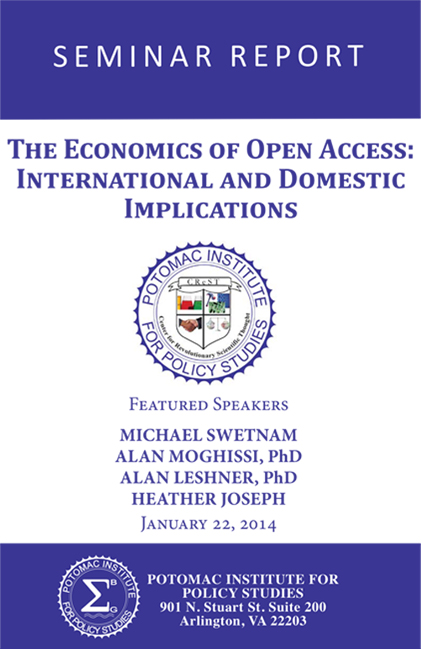 The Economics of Open Access: International and Domestic Implications
The Economics of Open Access: International and Domestic Implications
A discussion of one of the most fundamental issues surrounding science and technology – an issue important not just in the United States but, in fact around the world. That issue is access to research and science that is produced. Who owns what? What are the proprietary and publishing issues in an age of expanding technology? At its outset, it sounds like a simple question. Isn’t science something that belongs to all of us and shouldn’t access be open? But it turns out, as you will hear today and I am sure many of you know, it’s a very thorny issue. Science not only moves mankind forward in our understanding of the universe but it is also increasingly behind most economic development in the world. The question of access to science and ownership of science is very thorny, indeed. We want to discuss ways of recommending solutions to policymakers that are not just keeping science moving forward and incentivizing business, but are also incentivizing the population to continue to support and fund science. This goal is not just critical to our economy but in fact to the continued advancement of the human race. This, I believe, is one of the most important issues of our time and we are very proud that we are hosting a forum for this discussion. I would love to be able to say that, coming out of this forum, we will be able to write a document with defini- tive recommendations for our policymakers. Unfortunately, that will not happen today, but at least we can say that we’re contributing to the discussion and hopefully contributing to the ideas that will help policymakers work through this issue.
See the full report here
Executive Summary:
Washington, DC - David Brin, a world-renowned science fiction author and futurist, spoke at the Potomac Institute as part of the CReST Bold Ideas seminar series. Dr. Brin brings a novel perspective when looking towards the future, and spoke on several topics of current debate including data privacy, tribalism, regulation and fair play. His writings on these topics, both essays and fiction, have been pivotal in shaping public discussions on transparency and individual rights. His wide-ranging discussion is summarized below.
Dr. Brin discussed his concepts of transparency and sousveillance- “watching the watcher” - as the solution to current debates over digital privacy rights. He argued that the only way to destroy cheating and ensure individual rights is to break up power by democratizing technology. As the pace of technology development accelerates, he argues that we should not try to constrain technology because elites will always be able to find loopholes to get around these constraints. He criticized the European approach to data privacy as paternalistic in structure and therefore insufficient to fully protect individual rights. These concepts are described in his seminal nonfiction book, The Transparent Society, his recent book Chasing Shadows, and in his essays and speeches.
Brin discussed his concept of disputation arenas, in which there are five accountability arenas (markets, science, democracy, justice courts, and sports). Brin embraces conflict and competition within certain bounds, and notes that, “across all of human history the only time we’ve ever gotten the benefits of competition has been regulated competition.” To Brin, a fairly regulated arena is responsible for harnessing creative competition, and that competition is the greatest creative force in the universe.
Brin also touched on Hollywood themes, tribalism in politics, great power competition with China, and the need for every individual to be a critical thinker and contrarian.
David Brin is a scientist, tech-pundit, forecaster, NASA adviser, and best-selling author. He is best-known for shining light — plausibly and entertainingly — on technology, society, and countless challenges confronting our rambunctious civilization. His best-selling novels include The Postman (filmed in 1997) plus explorations of our near-future in Earth and Existence. His short stories explore vividly speculative ideas. Brin's nonfiction book The Transparent Society won the American Library Association's Freedom of Speech Award for exploring 21st Century concerns about security, secrecy, accountability and privacy. As a scientist, tech-consultant and world-known author, he speaks, advises, and writes widely on topics from national defense and homeland security to astronomy and space exploration, SETI and nanotechnology, future/prediction, creativity, and philanthropy. Urban Developer Magazine named him one of four World's Best Futurists, and he was cited as one of the top 10 writers the AI elite follow. David Brin’s website: http://davidbrin.com/
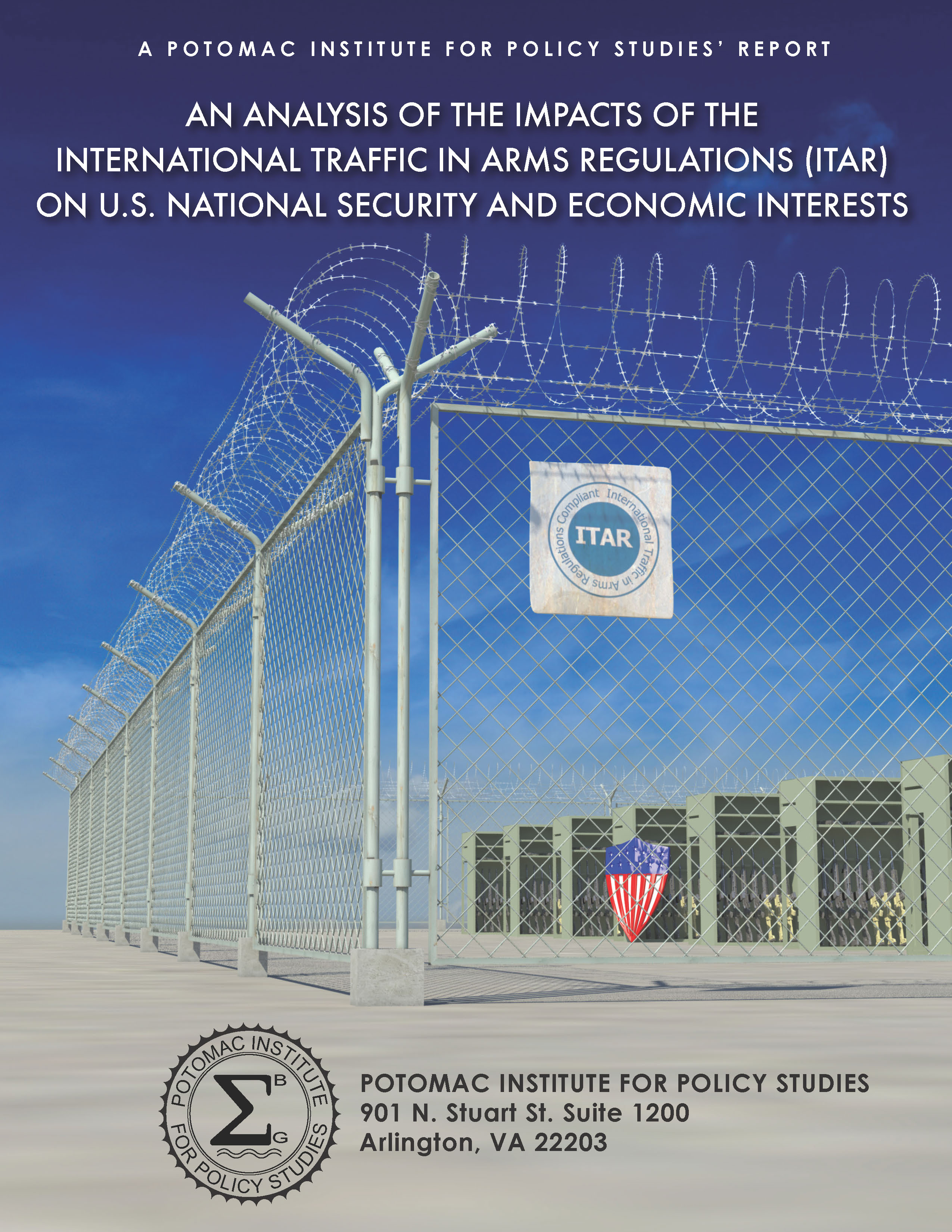 The International Traffic in Arms Regulations (ITAR), the set of regulations that limit U.S. exports in the name of national security, need to be rescinded with new enabling legislation because they continue to be a threat to the United States (U.S.) national security and economic interests despite a well-intended Executive reform initiative that has taken place over the last seven years.
The International Traffic in Arms Regulations (ITAR), the set of regulations that limit U.S. exports in the name of national security, need to be rescinded with new enabling legislation because they continue to be a threat to the United States (U.S.) national security and economic interests despite a well-intended Executive reform initiative that has taken place over the last seven years.
The Potomac Institute has followed and actively engaged in the decades of debate surrounding U.S. export control rules and laws. The Institute noted in 2009 that the Executive Branch began its Export Control Reform (ECR) Initiative to address the many concerns of various stakeholders, such as those highlighted in a 2009 National Academy of Sciences (NAS) report that examined the impacts of these rules and laws.12In 2015, the Institute opened a center focused on using science to improve regulations and regulatory policies –the Regulatory Science & Engineering Center (RSEC). One of its first studies was following up on the current reform initiatives taking place regarding the ITAR and determining what kinds of impacts the ITAR were still having on national security and economic interest related to science & technology (S&T).
In carrying out this study the Institute conducted an extensive literature review regarding government, industry and academic accounts of the impacts the ITAR were having on the U.S. Additionally, the study team held workshops and seminars with experts in actually implementing the ITAR reform efforts and leaders from the sciences, defense industry, information technology sector, academia, military and legal communities.
Our analysis found that the ITAR restricts companies’ abilities to develop and export certain technologies with potential military application. The regulations simultaneously inhibit international collaboration in relevant research and development, banning industry and academic scientists from sharing technical information with foreign entities and individuals. In today’s interconnected, globalized world that struggles with a diverse array of threats, ITAR impedes domestic scientific growth and weakens the national security of the U.S. and its foreign partners. In many ways our findings and conclusions reflect the same kinds of issues the NAS identified in 2009. Although, the recommendations of that study indicated the best solution was Executive rather than Legislative because it was believed Executive action could act more swiftly to address the many problems that needed rapid solutions.
After seven years, our analysis indicates that many of the same problems still exist that prompted the reform effort indicating that a new strategy needs to be considered. Efforts to reform ITAR have not been successful because the underlying assumptions of the ITAR framework are flawed. Therefore, we conclude that the best course of action is to sunset ITAR.
This report is a detailed account of our study methods and a thorough description of the findings, conclusions and recommendations from our analysis regarding the impacts of the ITAR on U.S. national security and economic interests related to S&T. The following is an abbreviated description of these findings, conclusions and recommendations.
1. National Research Council. 2009. Beyond “Fortress America”: National Security Controls on Science and Technology in a Globalized World. Washington, D.C.: National Academies Press. doi:10.17226/12567.
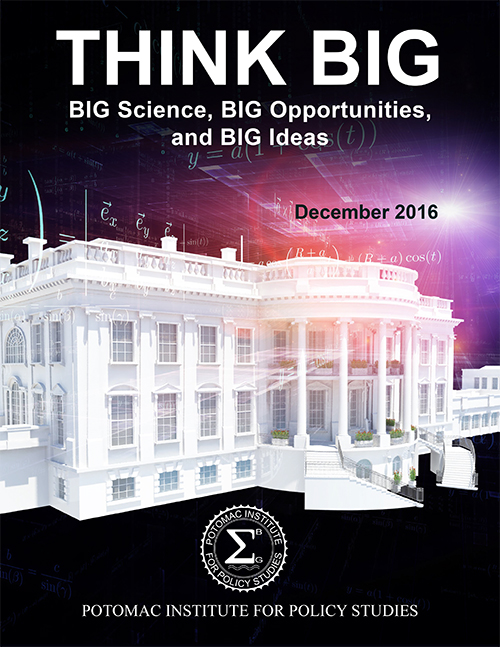 THINK BIG argues that innovation in science and technology are the keys to American economic strength and national security. Rather than a return to the infrastructure, economy, and healthcare systems of the past, the report calls for a vision for the future.
THINK BIG argues that innovation in science and technology are the keys to American economic strength and national security. Rather than a return to the infrastructure, economy, and healthcare systems of the past, the report calls for a vision for the future.
The report urges the new Administration to 1) develop policy based on the best available science and 2) use policy to foster the development of science and technology. The science and technology investment priorities identified in the THINK BIG report for the next Administration include:
· America’s Future Infrastructure
· Fostering American Industry Leadership
· Revolutionizing Medicine
· Climate Engineering
Download the full PDF here.
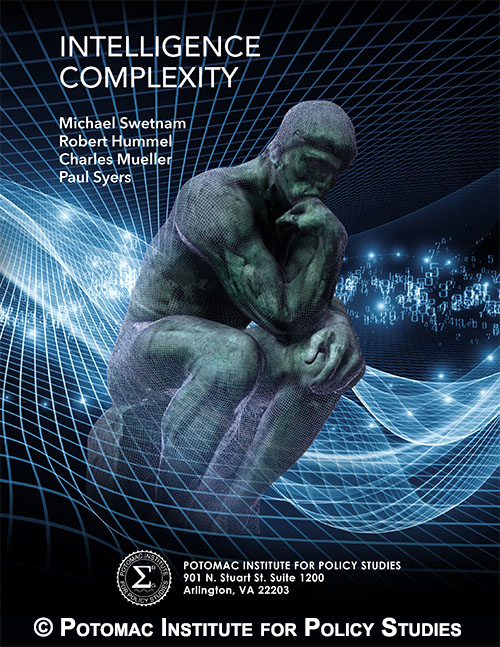 Intelligence Complexity details a theory of intelligence complexity based on discrete levels of intelligence: Data, Information, Knowledge and Wisdom (DIKW). The report provides detailed descriptions of each of these defined levels of intelligence and puts forward a framework that can be used to measure the intelligence complexity of any intelligent system. Intelligence Complexity’s DIKW framework provides an alternative to the Turing Test as a measure of a system’s ability to reach defined levels of intelligence.
Intelligence Complexity details a theory of intelligence complexity based on discrete levels of intelligence: Data, Information, Knowledge and Wisdom (DIKW). The report provides detailed descriptions of each of these defined levels of intelligence and puts forward a framework that can be used to measure the intelligence complexity of any intelligent system. Intelligence Complexity’s DIKW framework provides an alternative to the Turing Test as a measure of a system’s ability to reach defined levels of intelligence.
Intelligence Complexity also introduces a new concept (I = E x C) developed by author Michael Swetnam to explain what drives intelligent systems to learn. This theory posits that intelligence is inextricably linked to emotion, which is a key force that drives the development of human intelligence forward. The authors present a thermodynamic argument of emotion that attempts to explain the human intelligence system in terms of complexity, efficiency and entropy.
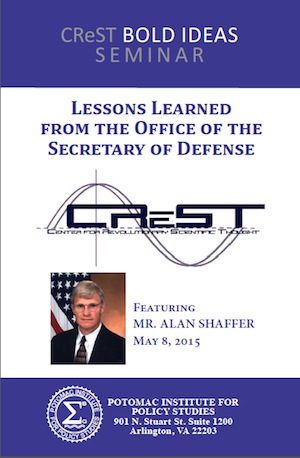 Mr. Alan Shaffer’s seminar provided key insights into personal experiences throughout his career, both in the Air Force and in public service. Furthermore, Mr. Shaffer spoke and reflected on lessons and highlights acquired from more than a decade of serving in senior roles in the Pentagon. Attendees were provided a glimpse into his Pentagon career as a leader in research and engineering, including assignments as the Acting Assistant Secretary of Defense for Research and Engineering. In this position, Mr. Shaffer was responsible for formulating, planning and reviewing the DoD Research, Development, Test, and Evaluation (RDT&E) programs, plans, strategy, priorities and execution of the DoD RDT&E budget totaling roughly $25 billion per year.
Mr. Alan Shaffer’s seminar provided key insights into personal experiences throughout his career, both in the Air Force and in public service. Furthermore, Mr. Shaffer spoke and reflected on lessons and highlights acquired from more than a decade of serving in senior roles in the Pentagon. Attendees were provided a glimpse into his Pentagon career as a leader in research and engineering, including assignments as the Acting Assistant Secretary of Defense for Research and Engineering. In this position, Mr. Shaffer was responsible for formulating, planning and reviewing the DoD Research, Development, Test, and Evaluation (RDT&E) programs, plans, strategy, priorities and execution of the DoD RDT&E budget totaling roughly $25 billion per year.
Mr. Shaffer discussed the acquisition and technology strategies employed at the DoD. He addressed the need for project managers to own the technological baseline, with an emphasis on technical expertise and experience. While the DoD operates on very complex statutory processes, Mr. Shaffer spoke to the Department’s ability to continue to be an innovating force. The DoD works in tandem with commercial technologies and Congress as partners in the technology innovation process. Mr. Shaffer posed his ideas for fueling agile innovation in the DoD through the development of open systems that work with industry, creating new markets for upgrades, and providing opportunities for creativity across all systems. Mr. Shaffer engaged the younger generation of attendees and reflected on the most important lessons from his career.
Download pdf here.
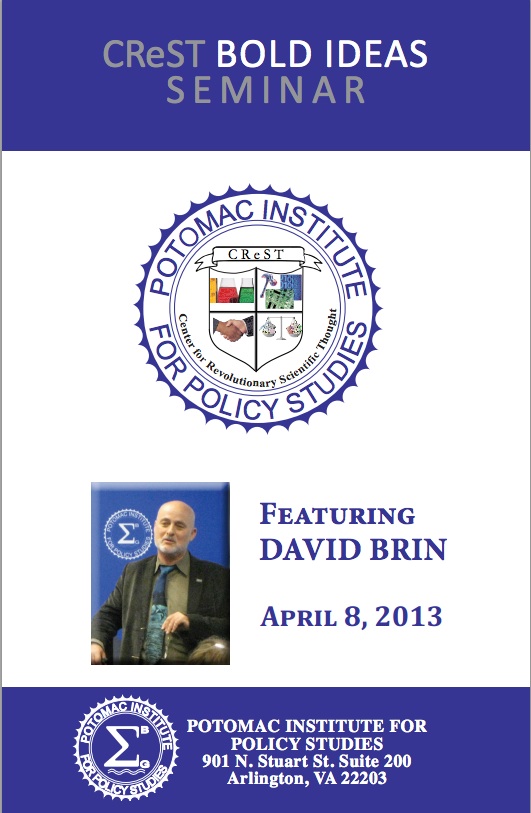 The CReST Bold Ideas Seminar series kicked off April 8, 2013, with David Brin - Scientist, Futurist, Author - speaking on "The Future Golden Age."
The CReST Bold Ideas Seminar series kicked off April 8, 2013, with David Brin - Scientist, Futurist, Author - speaking on "The Future Golden Age."
David Brin, a world–renowned science fiction author and the first speaker for Bold Ideas speaker series at the Potomac Institute, brings a different prospective when looking at the future, or as he refers to “the golden age”. Brin firmly believes that technology and science will help solve a majority of life’s hard problems, but humans are holding back because of a “crisis of confidence”.
Brin reminded the audience that today humans have powers that many believed centuries ago only gods possessed, such as light with a flick of a finger and flying in the sky. Humans have changed the structure of society from a pyramid arrangement, where a few ruled, to a more leveled field, from clans and tribes to multi-organization networks. Technology is the “game changer” for the future. Achievements, such as led lights and medical advancements, show how technology has enhanced the way of living. According to Brin, this is the “age of amateurs”. Humans educate themselves using technology, making it where they do not need professionals or experts for every problem that is faced.
Download pdf here.
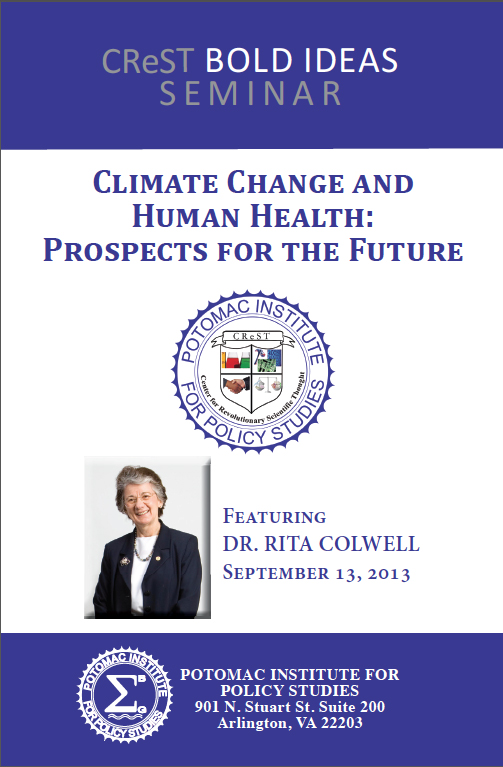 Studying infectious diseases and their causes, sources and spread can help build models to predict their spread, especially when factoring in ongoing climate change challenges.
Studying infectious diseases and their causes, sources and spread can help build models to predict their spread, especially when factoring in ongoing climate change challenges.
Potomac Institute Board of Regents member Dr. Rita Colwell spoke about “Climate Change and Human Health: Prospects for the Future.” Using cholera as an exemplar infectious disease, she considers the impact on human health in a world undergoing climate change. Cholera, which is caused by the bacteria Vibrio cholera, is found in many environments throughout the world, which leads to epidemics in areas with poverty, poor sanitation, and unsafe drinking water.
In an effort to understand these epidemics, Dr. Colwell’s research group has made use of satellite imagery and modeling to predict the spread of infectious disease, finding correlations between outbreaks of cholera and chlorophyll on the sea surface, air temperature, and rainfall. In analyzing the evolution of Vibrio cholera, Dr. Collwell notes that the bacteria and other Vibrio human pathogens are extremely similar to bacteria isolated from thermal vents 2500 meters below sea level.
With these novel findings, Dr. Colwell evaluated the recent cholera epidemic in Haiti in January 2010. Even before the earthquake, the record high rainfall and the hot summer were perfect preliminary conditions for the spread of cholera. The earthquake, however, led to a change in river pH, which, in combination with the other conditions, resulted in explosive growth of the bacteria. The case study of cholera in Haiti is an example of the link between climate change and infectious disease. The rise of heavily populated areas coupled with increased flooding and hotter temperatures will result in refugee migration, which can escalate the spread of disease worldwide.
The modeling can also be used to project the spread of other infectious diseases, as seen with Dr. Colwell’s research into Yersinia pestis in Tbilsi, Georgia. Moreover, satellite imagery and modeling can enhance the surveillance and response mechanisms of global health organizations. These advancements, along with further investment in safe drinking water and sanitation, could greatly reduce the spread of disease worldwide.
Download pdf here.
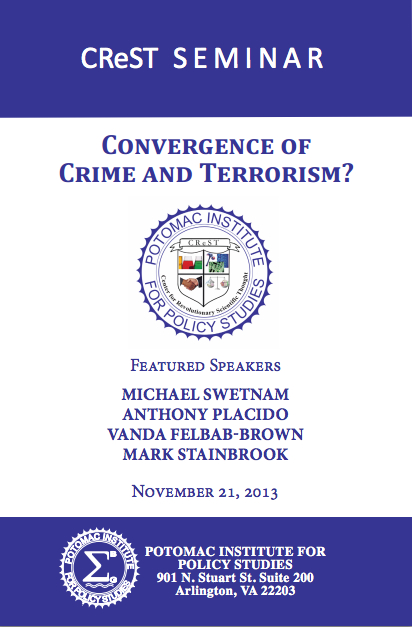 The “Convergence of Crime and Terrorism?” seminar was held at the Potomac Institute for Policy Studies on November 21, 2013. The seminar centered on the concept that criminal activity and international security are related. Drawing from personal experiences in law enforcement, federal government, and academia, the three panelists evidenced the ways in which crime and terrorism are linked and how law enforcement can stem this issue.
The “Convergence of Crime and Terrorism?” seminar was held at the Potomac Institute for Policy Studies on November 21, 2013. The seminar centered on the concept that criminal activity and international security are related. Drawing from personal experiences in law enforcement, federal government, and academia, the three panelists evidenced the ways in which crime and terrorism are linked and how law enforcement can stem this issue.
In sum, it is not accurate to describe transnational organized crime and terrorism as monolithic; yet it is known that they are inextricably linked. All three panelists provided various methods for dealing with this pressing issue. Mr. Placido argued that there is not a one size fits all approach, but that targeting the infrastructure of transnational organized crime can be effective. Dr. Felbab-Brown believes that the goal is to import the image of a “good” criminal, a criminal that does not collaborate with terrorists, is not very violent, is removed from society, and is without the capacity to corrupt institutions. Concluding the seminar, Mark Stainbrook stated that the goal of law enforcement is long-term prevention rather than detection, and that there exists a need to implement community-based police strategies.
Download pdf here.
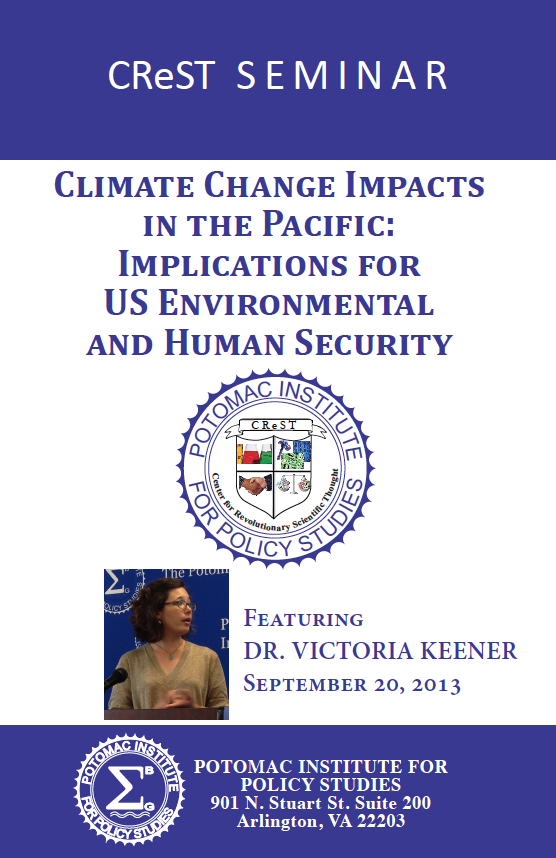 Accurate and consistent data collection on climate change is critical to helping develop effective disaster preparedness plans, and it impacts national security, food and water security, as well as immigration, according to Dr. Victoria Keener, Research Fellow at the East-West Center in Honolulu.
Accurate and consistent data collection on climate change is critical to helping develop effective disaster preparedness plans, and it impacts national security, food and water security, as well as immigration, according to Dr. Victoria Keener, Research Fellow at the East-West Center in Honolulu.
The report and transcript of the discussion about the wide-ranging impacts of climate change in the Pacific are highlighted in the report, now available
Download pdf here.
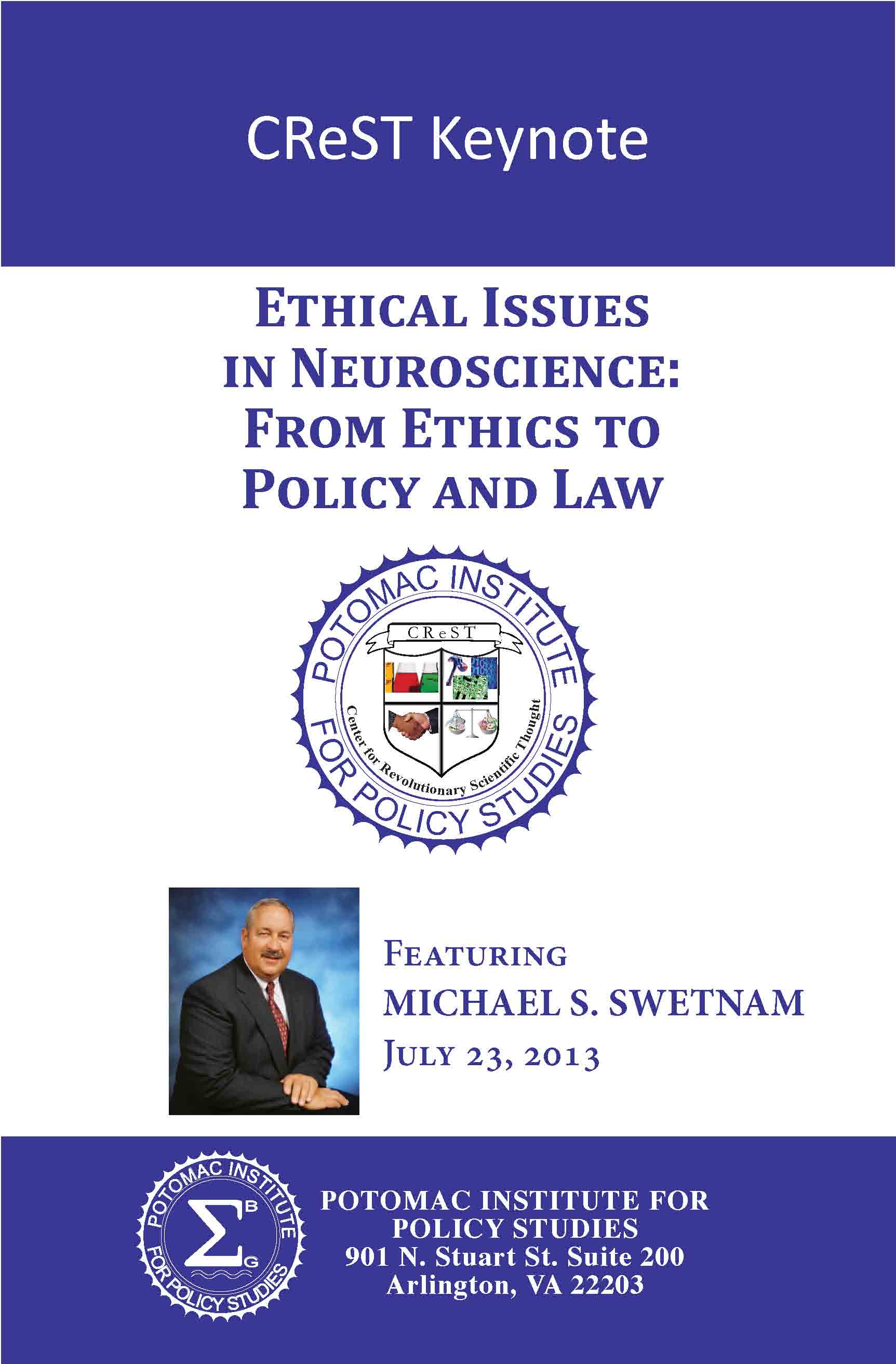 Potomac Institute CEO and Chairman Michael S. Swetnam provided the keynote speech to the neuroscience community at a one-day symposium on "Ethical Issues in Neuroscience."
Potomac Institute CEO and Chairman Michael S. Swetnam provided the keynote speech to the neuroscience community at a one-day symposium on "Ethical Issues in Neuroscience."
Attendees included those who are working in or interested in learning about the intersection of neuroscience with policy, law, ethics, media, and society. Speakers included personnel from government, industry, think tanks, and academia. The symposium addressed the topics of neuroethics in defense, promoting and teaching neuroethics, and transitioning the focus from ethics to policy and law.
Download pdf here.
-
Hey Industry, you’re welcome, for almost everything. Love, the Federal Government.
12-12-2019
It’s time for Silicon Valley and all the other tech giants across commercial industry to stop sticking their nose up at working alongside the federal government, roll up their sleeves, and do some...
Read more: Hey Industry, you’re welcome, for almost everything. Love, the Federal Government.
-
It’s Time to Finally Regulate Google
08-22-2019
By Alyssa Adcock The U.S. government must bring antitrust action against Google immediately. This should include (1) requiring Google to make its full search algorithm public and (2) prohibiting it...
-
The Potomac Institute for Policy Studies Calls for a Coordinated National Space Strategy on the 50th Anniversary of Apollo 11
07-17-2019
Our nation’s reliance on space has reached unprecedented levels, and the federal government must have a unified strategy commensurate with its importance. Since the launch of Sputnik in 1957, the...
© 2024 Potomac Institute for Policy Studies

